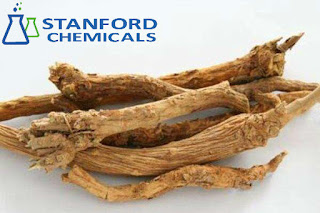Antibacterial Ingredients Extracted from Persian Onion
Antibacterial ingredients extracted from Persian onion can increase the efficacy of existing antimicrobial agents.
Recently, a new study shows that a green onion can help fight antibiotic resistance in some TB cases. Researchers believe that the antibacterial components extracted from Persian onion can increase the efficacy of the existing antimicrobial agents.
The research team tested four different molecules of the Persian onion. The researchers found that the bacteria in the multidrug-resistant tuberculosis were significantly reduced and significantly decreased, and the most promising candidates could inhibit the growth of the isolated tuberculosis cells by more than 99.9%.
The compounds extracted from the Persian onion are two sulfides, one of which has an antimicrobial activity and can inhibit the growth of Mycobacterium tuberculosis at the concentration of 17 M (4 mg L 1), and other analogues (the concentration range 32~138 M [8~ 32 mg L 1) can inhibit the Escherichia coli. Bacteria and multidrug can resist Staphylococcus aureus. These compounds also have certain inhibitory effects on Klebsiella pneumonia and Proteus.
The team believes that these compounds can be used with existing antibacterial agents to fight TB resistant strains.
The researchers said they hoped that the molecules tested in the laboratory could be combined with the existing antibiotics to form new anti TB drugs and giant knotweed.
For more information, please visit http://www.stanfordchem.com/Herbal_Extracts.html
Recently, a new study shows that a green onion can help fight antibiotic resistance in some TB cases. Researchers believe that the antibacterial components extracted from Persian onion can increase the efficacy of the existing antimicrobial agents.
The research team tested four different molecules of the Persian onion. The researchers found that the bacteria in the multidrug-resistant tuberculosis were significantly reduced and significantly decreased, and the most promising candidates could inhibit the growth of the isolated tuberculosis cells by more than 99.9%.
The compounds extracted from the Persian onion are two sulfides, one of which has an antimicrobial activity and can inhibit the growth of Mycobacterium tuberculosis at the concentration of 17 M (4 mg L 1), and other analogues (the concentration range 32~138 M [8~ 32 mg L 1) can inhibit the Escherichia coli. Bacteria and multidrug can resist Staphylococcus aureus. These compounds also have certain inhibitory effects on Klebsiella pneumonia and Proteus.
The team believes that these compounds can be used with existing antibacterial agents to fight TB resistant strains.
The researchers said they hoped that the molecules tested in the laboratory could be combined with the existing antibiotics to form new anti TB drugs and giant knotweed.
For more information, please visit http://www.stanfordchem.com/Herbal_Extracts.html





Comments
Post a Comment